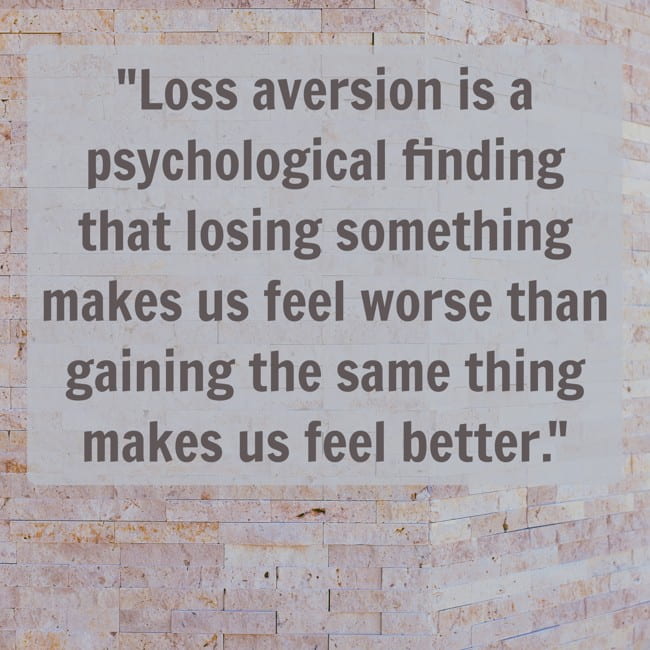I’m republishing about fifteen-or-twenty columns/articles I wrote for various publications like ASCD and The Washington Post over twelve years ago, but which are no longer available on their websites. I still think they have some relevance today. I’ll add links to these posts to the page where links to all my articles are located.
This 2012 column appeared in The Washington Post.
Uh oh, educators, hold onto your hats! It appears that a new catchphrase is coming to school reform, and it’s called “loss aversion.”
Loss aversion is a psychological finding that losing something makes us feel worse than gaining the same thing makes us feel better.
A group of economists published a study two weeks ago implementing this strategy with students . They wanted to see if students would try harder on a standardized test if they knew they would get cash or some other kind of immediate prize if they improved on their results. They tried offering these rewards in a couple of different ways, but found the biggest test improvement would come if they gave the student the money ($20) or non-cash award before the test and then told them they would have to give it back if they didn’t score well.
There are a number of issues with this study, including the fact that the gains do not appear to have carried over to carry over to the future and that it appears to be a relatively small number of students. The authors also appear to ignore recent studies that have shown that loss aversion can have particularly damaging effects on many people:
….they start worrying about losing it….And this is why the striatum, that bit of brain focused on rewards, was going quiet. Instead of being excited by their future riches, the subjects were fretting over their possible failure. What’s more, the scientists demonstrated that the most loss-averse individuals showed the biggest drop-off in performance when the stakes were raised. In other words, the fear of failure was making them more likely to fail. They kept on losing because they hated losses….
Most importantly, though, let me tell ya’, implementing that kind of policy would really help create a positive classroom culture!
One of the researchers vividly illustrated the impact this kind of intervention could have on students during a network interview . Here’s an excerpt:
Q: The ones that did badly — did you rip it away from them and then did they scream and cry?
A: Yeah, it’s hard when you rip a trophy out of the hands of an eight year old.
Yup, that’s what we should be doing — not try to figure out how to help students motivate themselves. Instead, let’s emphasize Bribing students: Another ‘magical solution’ that doesn’t work.
And let’s make sure we place even more of an emphasis on standardized tests while we’re at it, and make sure we re-emphasize the genuine learning must equal increased scores.
This study is bad enough.
But it doesn’t stop there.
Last week many of these same economists issued a new study — this time analyzing the use of “loss aversion” on teachers as a form of merit pay. Since every U.S. merit pay study where a carrot has been hung in front of teachers has found that it doesn’t work and might even make things worse, some people just won’t take no for an answer.
The study claims they found that if they gave teachers several thousand dollars at the beginning of the year and told them they’d have to return it if their students didn’t do well on math tests, then students did better on those tests (there was no impact on score improvement for students of teachers in the group that were offered bonuses after the test — the more typical merit page scheme). The study only included teachers from nine schools and student scores were also not tracked past one school year.
I questioned what kind of positive classroom culture a “loss aversion” strategy would create with students, and I wonder what kind of effect a similar plan with teachers would have on school culture. The usual kind of teacher merit pay is bad enough but it seems to me that this kind of threatened “take-away” strategy might even be more offensive. It exemplifies what behavioral economist Dan Ariely said as part of the National Research Council report criticizing the role of testing in education:
“These policies are treating humans like rats in a maze. We keep thinking about how to reorganize the cheese to get the rats to do what we want. People do so much more than that.”
If these economists have money they want to spend on seeing what improves academic achievement in schools, I’ve previously shared my suggestions on how to spend it here.
I also wonder how the professors who wrote the study would feel if their salaries incorporated a loss aversion component?
I suspect they might say their situation is different because, as they claim in their study, “teacher quality and aptitude has declined significantly in the past 40 years,” so we K-12 teachers are the ones who need this kind of program — not them.
Abraham Maslow said “If you only have a hammer, you tend to see every problem as a nail.” It appears that many (though not all) economists see teachers and students only through the lens of financial incentives.
Ironically enough, over the weekend a biting critique of how economists tend to view the world appeared in….The Economist magazine. Here are a few excerpts:
Do economists have an accurate model of human motivation? Or do they assume that our motives are entirely mercenary?
….This other-wordly mentality is reminiscent of Catherine the Great’s aphorism about political ideas which “work only on paper, which accepts anything, is smooth and flexible and offers no obstacles either to your imagination or your pen.”
A related criticism is that economists tend to think that most problems can be created by designing the right incentives.
….In short, many economists seem to neglect the importance of non-financial motivation…
….The history of economics can be viewed rather like the regular sequence in the Peanuts cartoon strip, whereby Lucy snatches the football away every time that Charlie Brown tries to kick it. Just when economists have reached a consensus, events in the real world proved them wrong.
I wish the vast majority of economists would just stay away from schools — you’d figure they’d have enough other things to do.
I’m republishing about fifteen-or-twenty columns/articles I wrote for various publications like ASCD and The Washington Post over twelve years ago, but which are no longer available on their websites. I still think they have some relevance today. I’ll add links to these posts to the page where links to all my articles are located. school reform Larry Ferlazzo’s Websites of the Day…









